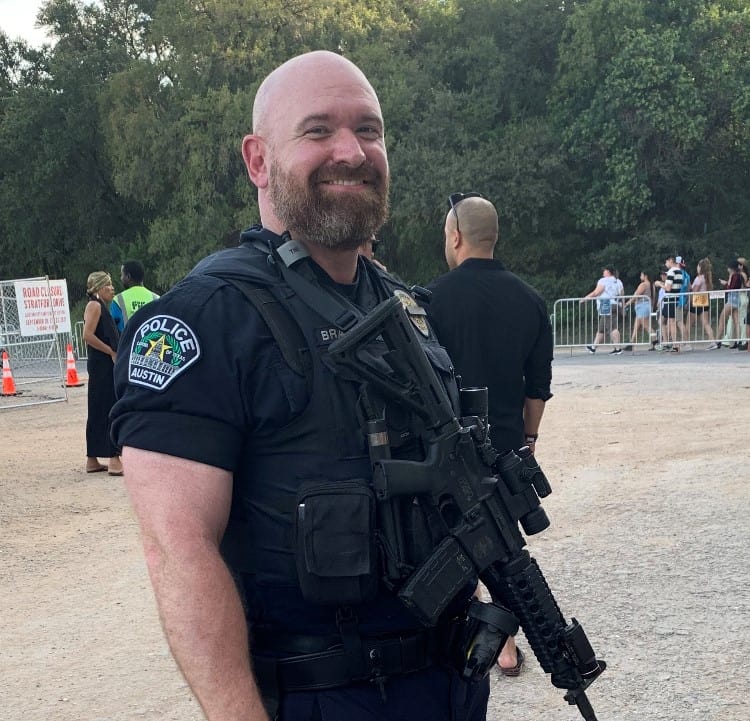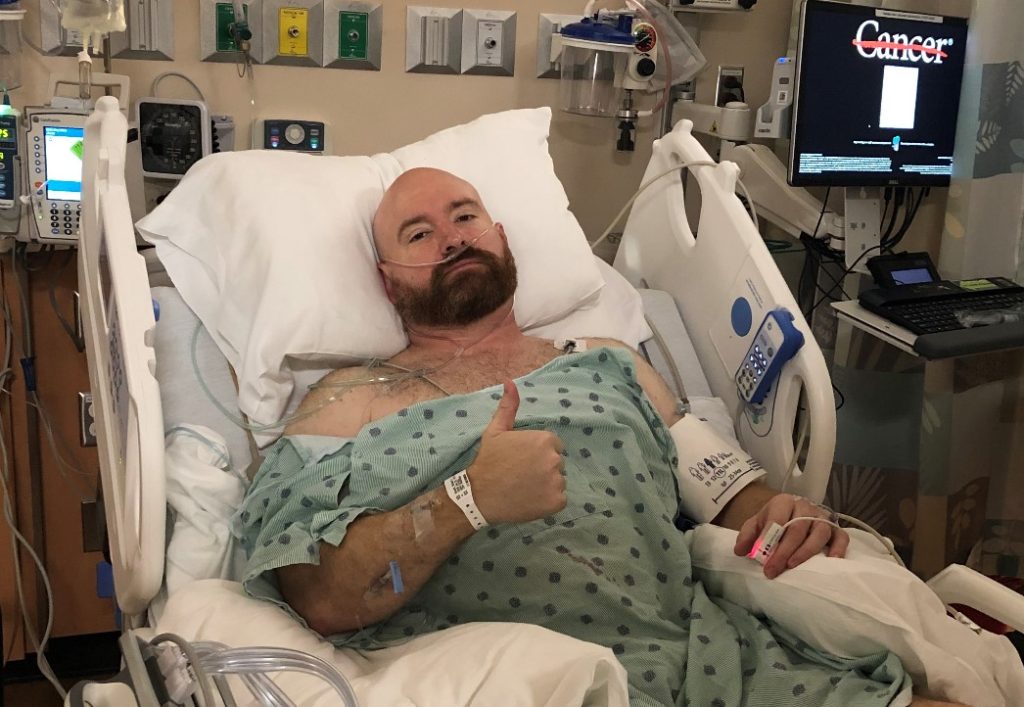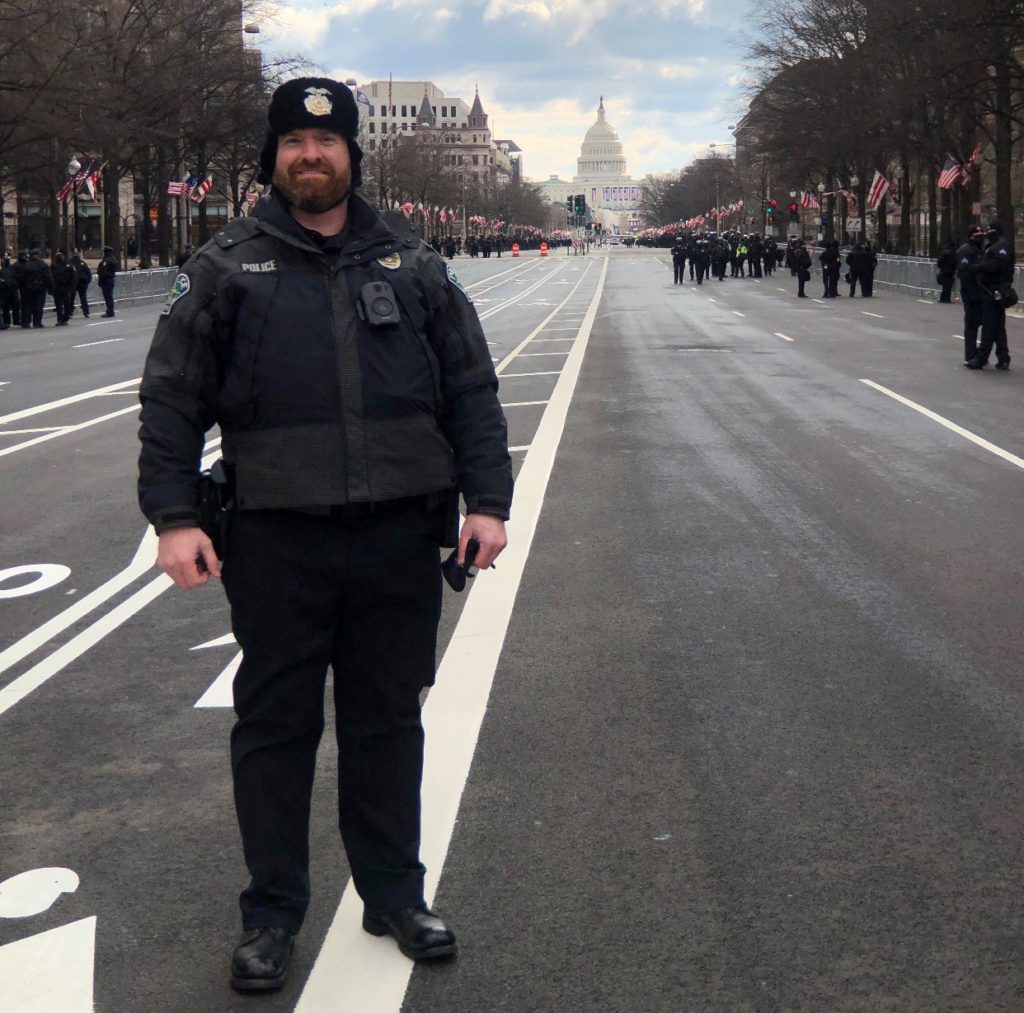What is it like to be a police officer in 2022? What is it like to be a patrol officer in their 40’s? What is it like for an officer to navigate this difficult job when they have a baby on the way?
And what is it like to be a cop with a prostate cancer diagnosis in the middle of all of this?
Officer Robert Brady is an officer who is navigating these difficulties. In 2019, he was diagnosed with prostate cancer. Since then, he has been vocal about his experience, hoping that his story can help and inspire others who are going through similar struggles.
The story below is in his own words.
Life before the diagnosis

“I never quite understood how carefree my life was prior to the diagnosis. It seems so cliché that getting a diagnosis like that is life changing, but it really is in the sense that it gives you a very raw perspective on your mortality.
For the longest time I never thought about my mortality, even as a police officer and even while responding to the most dangerous 911 calls we go to every single day. Before I was a police officer I lived in Iraq for three years and did three rotations to Afghanistan. Of all the crazy things I’ve done in my life, I’ve never really experienced fear, especially the fear of my mortality because my life was always in my hands. Cancer takes that away from me. All of a sudden my life, health, and mortality isn’t in my hands.
Unwelcome news
I had done a random blood test in June of 2019 when I was 41 and had gotten my PSA checked. Normally they don’t check PSA until you’re older, but I had gotten tested. It was a total fluke that I got tested, and the doctor said my PSA level was high. The crazy thing is that I had no symptoms whatsoever that anything was wrong. Prostate cancer tends to be asymptomatic until it is too late. That’s while it’s called the ‘silent killer of men.’
I truly believed that these PSA results were going to be nothing. I was healthy and had no problems or symptoms. When I went in for my biopsy test results, I went in wearing gym clothes because I thought I’d just go to the gym afterwards. When I got the diagnosis of stage 2 prostate cancer, I didn’t realize how bad it was going to be.
I drove to the gym parking lot, and I sat there for six hours. I was there all morning and afternoon. I was trying to Google everything and understand all the different aspects of how I’m going to solve prostate cancer in the gym parking lot. I was trying to figure out the costs because my wife and I were trying to have children, and I knew that IVF was not going to be covered by our insurance. I was looking up loans and home equity lines of credit and how much IVF was going to cost.
It’s a hard thing to be afraid of, and it’s a hard thing to admit to being afraid of. It has left me with a foreboding question of how I take care of my wife and unborn child if this gets worse. How can I provide for them if this doesn’t get sorted and I’m gone? That’s where my mind goes quite often, and it’s front and center in my mind all of the time because all of a sudden my life is not in my hands and there’s nothing I can do about it.. I have a pregnant wife and a son on the way, and I want to be a part of his life and be a good influence on his life.
Support from leaders
The Department really, really, really went out of their way to help me. When I initially got the diagnosis, I didn’t tell anyone because I didn’t want to be treated any differently. I thought my wife and I could get through this without help. But when you get an initial cancer diagnosis, you have doctor’s appointments every single day.
I can’t stress this enough; you literally have doctor’s appointments every day of the week, and you have cancer so you have to take the absolute earliest available appointment regardless of what time it is. It’s not something you can negotiate for when you have a day off and keep pushing things back.
The problem was some of these appointments were 8:00am, and I was working from 6:00pm to 4:00am. I couldn’t swing getting off at 4:00am to be at a doctor appointment at 8:00am. I started feeling this overwhelming guilt for using sick leave all of the time, so I felt the need to tell my Sergeant, Mike, and my LT, Mark, about it because I didn’t want them to think I was a dirtbag for being gone all the time.
I had to call in sick the next day, and when I came back they said, “Hey, we’re giving you a temporary assignment at the Austin Regional Intelligence Center so you can make it to all your doctor’s appointments and focus on your health. Man that was huge. That was a really, really huge gesture.
Plus, all of a sudden when I had doctor’s appointments every day of the week, it was skyrocketing my bills. We had a $25 co-pay, but I was paying it five days a week or more with multiple appointments per day. All of a sudden bills were coming in, and that’s just the co-pays.
Working through challenges

In October of 2019, I went through the surgery and had my prostate taken out. I was on no-duty status until January of 2020. But I pushed it, came back to light duty too soon and to didn’t let my body recover. But I felt guilty about staying at home. I came back on light duty and then COVID hit. I stayed on light duty until June of 2020, and came back to work.
I was only back for a very short time before my surgery scar from the first surgery tore open which caused me to start herniating out of the front of my abdomen. I had to have another surgery, and that put me out of commission for a few more months before I came back to work for most of 2021.
I thought I was in the clear, and we wanted to have a baby. We had a wonderful doctor reach out to us after he heard about my situation and waved all his fees to help us have a child. But even with his exceptional generosity we ended up with $47,000 in IVF related bills. In the end, we had two boy embryos and seven girl embryos.
The first attempt to implant with a boy embryo was initially successful, but we ended up having miscarriage and lost the baby in October of 2021. It was tough, and I did not realize how hard the miscarriage was going to hit me. I really did not understand how much that was going to hurt. Long before my cancer diagnosis, my wife and I had discussed family planning. We wanted two boys first and then a girl.
When the embryos came out as two boys and seven girls, we thought, ‘it was meant to be.’ But when we lost that boy, it changed our entire perspective on what we thought our family would look like. We went into the second implant nearly every day praying we would have twins.
Recurrence
I was clear for nearly two years. Then in the summer of 2021 my PSA levels were high again, and I thought the cancer may have come back. I had a talk with my Commander, Jeff, and he helped get me on a daytime patrol shift so I could manage a new round of doctor’s appointments. Eventually I was clear.
My wife got pregnant with our second baby. After that happened, the cancer came back. I’ve started radiation already and there’s another 25 treatments to go. Currently my wife is 32 weeks along, and the baby is due October 21st. My radiation started August 17th, and I do radiation 5 days a week until it ends October 11th, and the baby is due October 21st.
The kid is exciting, but being alive long enough to be an influence on his life is the scary part. I would not have signed off on going through with IVF if I knew I still had cancer. I wouldn’t have brought a life into this world not knowing if I would be around to be a positive influence on him.
Here’s the worst part: Right now, and before the diagnosis, I never had any symptoms. Even now after all my surgeries, I have no symptoms. I have nothing physically wrong with me, but I have to start this radiation treatment because it’s growing inside of me and I don’t know it. It’s a very weird thing because it’s not like I injured my knee and I feel the pain and know something is wrong. That’s the part that bothers me.
I’ve lost all pride in trying to be stoic and do it all on my own. I definitely didn’t want to ask for help, but I definitely needed it, and I didn’t know how to go about doing it the right way. I’ve got a baby on the way and I’m dealing with cancer. It’s hard to admit, but everyone knows I’m struggling right now, but I’m fortunate to have friends that have stayed on top of not leaving me alone right now. It’s humiliating. It’s a really hard thing to accept help and say thank you.
Everybody takes really bad news differently. We as human beings don’t know how to deal with getting traumatic bad news, and everybody’s reaction is different. Some people want to be positive, some encouraging, some funny. I’ve also had people tell me, “at least it’s an easy cancer” and, “at least you won’t lose your hair.”
Still on the job
I started work again on Friday August 19th on light duty, and I didn’t know how bad the radiation was going to affect me. They say fatigue and lethargy, and it hits everyone differently, but it’s been pretty rough.
My options were to do radiation or radiation with hormone suppression therapy. No part of me wanted to do that, but the doctor sent me home with a medical case study. Radiation alone had a 70.4% chance of success, but radiation plus hormone suppression therapy has an 87.9% chance of success.
With a baby on the way, I had to swallow my pride and do the treatment that is necessary so I can have the best chance of being a part of this young man’s life. Yesterday I started doing androgen deprivation therapy.
There’s always somebody who has it worse than you do, and you can draw comparisons to other injuries and say where, but if you’re a guy and you want a higher quality of life, it is not an easy choice. There are three treatment options; surgery, radiation, or observation. Because prostate cancer mostly shows up later in life at age 70 and up, a common decision at that age is to observe and live with it rather than go through the treatment options.
Support for others

Because I became vocal about my experience, periodically someone will reach out to me and tell me their dad or their uncle got the diagnosis. Some retirees have gotten it since they retired. I reach out to them and we have a candid conversation about the different options and what you will go through. It is a pretty brutal conversation to have, but it is forthright and it is necessary.
Some people who get the diagnosis don’t want to talk about it with anyone but another person who has gone through this. For the most part, many people I told just didn’t know how to react, and that was something I had to learn to get past. You have to give people a little bit of a pass.
Sometimes I feel like I’m living in a country music song. Everything that can go wrong goes wrong, but sometimes it can go right. Sometimes you have to laugh about it because it’s tragic otherwise.
There comes a certain point in your career where you have knowledge that needs to be passed on. Right now I don’t think about doing cool-guy stuff anymore. I think about promoting and mentoring young officers. I think about following in my supervisors’ footsteps and being the next Mike or Eric or Jeff, all of the wonderful leaders my Department that have taken care of me and protected me. Those guys went out of their way to mentor and help me, so nowadays I think about mentoring young officers and showing them what true leadership is.
If I had any advice for males it’s to always get your PSA levels checked, and get checked earlier in life than you think is necessary. I want to give people hope. The recovery is tough, but you can do it. The earlier you detect the cancer, the better options you have, and you may be able to cure it without going through the experience I had.”
If you would like to reach out and talk with Rob about his experience, you can email him at rob.and.jessica.beat.cancer@gmail.com. If you would like to support Rob, please visit his GoFundMe page at https://gofund.me/1f6feddc.
